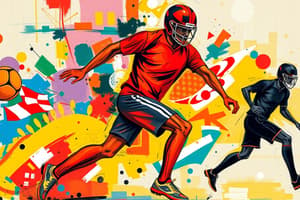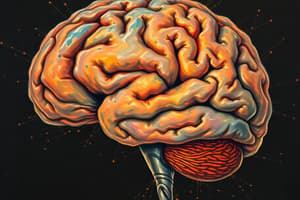Podcast
Questions and Answers
What is a key focus of task-oriented motor learning?
What is a key focus of task-oriented motor learning?
- Increasing resistance training
- Improving cardiovascular health
- Restoring functional movement (correct)
- Enhancing social skills
Which theory emphasizes the role of motivation and self-determination in motor learning?
Which theory emphasizes the role of motivation and self-determination in motor learning?
- Cognitive Behavioral Theory
- Behavioral Theory
- Social Cognitive Theory (correct)
- Constructivist Theory
Which of the following is NOT a component of Timmerman's training for task-oriented learning?
Which of the following is NOT a component of Timmerman's training for task-oriented learning?
- Contextual interference
- Recovery
- Transfer of learning
- Motor performance appraisal (correct)
In which stage of function and dysfunction do skilled movements become more fluid and automatic?
In which stage of function and dysfunction do skilled movements become more fluid and automatic?
What learning type is characterized by the transformation of existing skills into more refined forms?
What learning type is characterized by the transformation of existing skills into more refined forms?
What approach combines remediation, adaptation, and compensation in occupational therapy?
What approach combines remediation, adaptation, and compensation in occupational therapy?
Which of the following is not a factor in client motivation according to the context provided?
Which of the following is not a factor in client motivation according to the context provided?
What term is used to describe the gradual increase in degrees of freedom for performing skilled movements?
What term is used to describe the gradual increase in degrees of freedom for performing skilled movements?
Flashcards are hidden until you start studying
Study Notes
Motor Learning Theories
- Rehabilitative approach draws on information from multiple areas of study, including psychology, behavioral sciences, neurology, medicine, and allied health research.
- Motor learning directly relates to task performance.
- Task-oriented approach is client-centered and uses a top-down approach.
Focus
- Restoring functional movement.
- Applicable to a wide range of health conditions.
- The most motivating tasks for recovery are chosen by the client and are meaningful to them.
Theoretical Base
- Nonlinear science: focuses on the complexity of movement and how it is dynamic and constantly changing.
- Neuroplasticity & brain self-organization: The brain's ability to rewire itself and adapt to changes.
- Social Cognitive Theory: emphasizes the interplay of social, cognitive, and behavioral factors in learning.
- Motor learning: the process of acquiring and refining motor skills.
- Motor control: the neural and physiological mechanisms involved in coordinating movement.
- Recovery of function: the process of regaining lost function after injury or illness.
Theoretical Base (cont.)
- Learning Theory (Shumway-Cook & Woollacott, 2012):
- Associative Learning
- Procedural learning: Learning how to do something without needing to consciously think about it. (e.g. riding a bike)
- Declarative learning: Learning information that can be consciously remembered and recalled. (e.g. memorizing facts)
- Nonassociative Learning
- Habituation: The process of getting used to a stimulus and decreasing your response to it. (e.g. getting used to the sound of traffic)
- Sensitization: An increase in response to a stimulus over time. (e.g. the feeling of anxiety when a doctor walks into the room)
- Associative Learning
Theoretical Base (cont.)
- Task-Oriented Motor Learning Theory:
- Schema theory (Schmidt, 1975; Schmidt & Lee, 2005): People use their past experiences of movement to adapt to new situations, helping create a "motor schema".
- Ecological theory (Newell, 1991): Movement is influenced by both the person and the environment.
Theoretical Base (cont.)
- Task-Oriented Training:
- Timmerman's training components: Uses practice and repeated movements to improve skill with feedback.
- Contextual interference: Using varied practice styles or environments to facilitate learning.
- Transfer of learning: The ability to apply a learned skill in a different context.
- Recovery: The process of regaining lost function after injury or illness.
Function & Dysfunction
- Continuum from Function to Dysfunction:
- Cognitive stage: Initial learning stage where the focus is on understanding and planning the task.
- Fixation stage: The focus shifts to refining the movements, improving accuracy and consistency.
- Autonomous stage: The skill is automatic and requires minimal conscious effort.
- Function: A gradual increase in the range of motion and how movements are performed.
- Compensatory strategies: Replacing lost abilities with other functions or using assistive devices.
Change & Motivation
- Change:
- Learning motor strategies through trial and error.
- Refining skilled movements through practice.
- Motivation:
- Social and occupational roles that the client identifies with or aspires to.
- Client-selected tasks that are challenging and meaningful.
Evaluation
- Dynamic: The evaluation is constantly evolving and re-evaluated based on the client's progress.
- Conducted during occupational and role performance in natural settings: The evaluation should assess the client in their real-life environment rather than a clinical setting.
Intervention
- One holistic approach: This includes:
- Remediation: Re-learning and regaining lost skills and abilities.
- Adaptation: Modifying the task or environment to make it easier for the client to complete.
- Compensation: Using adaptive strategies to overcome limitations.
- Evaluation and intervention occur simultaneously. This allows for continuous adjustments and provides feedback to modify the plan as needed.
Weight-Bearing Strategies for Occupational Performance
- Normalize high and low muscle tone: Use strategies like positioning, weight-bearing, or sensory input to help control muscle tone.
Studying That Suits You
Use AI to generate personalized quizzes and flashcards to suit your learning preferences.




